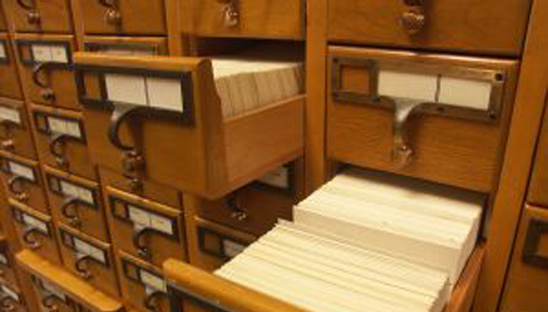
The world of bookselling and booksellers has changed dramatically in the last 30 years or so. But not so the printed book. Old, new, soft, hard, rare, illustrated, kids…books are virtually unchanged. They have endured. They abide in spirit and reality. But some things have changed. Most books are now chosen from sites online and delivered to their new owners.
Not so before the late 90s. Most books were acquired at bookstores. Most bookstores are gone now. If you have one near you, treasure it. Introduce friends and family to visiting actual bookstores.
The following touches on some of the more colorful aspects of pre-internet book buying. It also touches on one mail order bookseller whose modus operandi involved files and data…and even his own “web.”
Although most booksellers are thoughtful, helpful, erudite etc., the used and antiquarian book trade has a long tradition of “characters” portraying themselves as business people. There used be LOTS of GOBs (Grumpy Old Booksellers.) Has the ratio of quirks versus staid studious booksellers has changed over the years? Maybe. Or maybe there are still many, many out there selling their books (or not) from basements and garages via the internet. You don’t need a public place to sell your books any longer and that suits many of these folks well. It likely helps them too since their customers can’t hear them ranting and raving online.
Where do I fit in? Somewhere in between I guess.
But in the old days—not very long ago actually—almost every town had a used bookstore or two or five. Whenever booklovers (including other booksellers) would travel, one of the first things they’d do upon arriving in a new town was to find a phone book. You’d go to the Yellow Pages (actually printed on yellow paper.) You would turn to “Books—Used and Rare” and read the ads placed there by booksellers in the area. Some would state “By Appointment Only” often indicating they were selling out of their home. It was really a crapshoot to try to find some of the more out of the way “bookshops.” On more than one occasion I pulled up to a dodgy-looking venue only to turn around and pull away immediately.
There are countless anecdotes of grumpy booksellers refusing to sell someone books or even kicking them out of their shops because he didn’t like their looks or feel they were worthy of handling much less purchasing their books.
Others would have shops where none of the books were priced. When asked the bookseller would size you up and tell you the price…or not… “That’s not for sale.”
One (likely many more than one) famously tore a book in two and threw it to the floor after a customer repeatedly wheedled for a discount and got under his skin, “Now you can have it for half price!”
There were smokers—cigarettes and pipes—the air in their shops was always gray. Their books always carried a tobacco aura if you decided to buy any.
Others were “No Touchy.” You could not handle any—ANY—of their books. This made sense sometimes if the books were fragile or very valuable—but most books are quite durable.
There were the “watchers” who would follow you around their store—lurking behind you or just around the corner looking at your every move.
There were ranters and ravers who yelled at themselves, at visitors or just at the heavens in general.
Some you needed an introduction from a fellow collector or bookseller to get in the door. One colleague sent me an anecdote that when he called an old time specialist and said he’d been referred by “xyz” and that he’d like to visit, the GOB told him, “Never heard of you.” And he let out a stream of expletives as he slammed the telephone down. I guess most people nowadays can’t slam the phone down on you—just push the “End Call” button.
And then there were drinkers. One fair organizer would famously instruct and herd the exhibitors, including yours truly, during setup early in the morning before the show opened. He would rally us with a bullhorn in one hand and a bottle of beer in the other. Maybe not the first of the day. Certainly not the last.
And I’ve heard tell of more than one bookstore dispute escalating to a fistfight—with the proprietor throwing the first punch.
I miss these guys. Well, maybe not all of them.
One of my very first experiences after becoming a bookseller was a visit to a grumpy old bookseller.
His name was Ken and he had good reason to be grumpy when we visited. He was selling out his inventory—going out of business.
I was all of 25 years old when I took the leap of faith to open a used bookstore in Frederick, Maryland. Fortunately, there must have been a guardian angel looking over me.
“Ahem!”
Or more likely it was my Book Muse who had been there to save me from myself among many other rescues—perhaps my whole life.
“Are ye telling a story here or not?”
It was no doubt my Muse who urged me to ask for a “summer job” at one of my favorite used bookstores in Gaithersburg, Maryland. I had plans to go to grad school in the Fall. It was also my good fortune that the proprietor was a Dickensian fellow not unlike Old Fezziwig in the Christmas Carol. He was patient and gregarious. He even had a Dickensian look about him. Half glasses were perched on the end of his nose. He had a ruffled little “hair island” rising at the top of his forehead. But he taught me about people and service and ethics and hard work. He wasn’t the most scholarly bookseller by any means. But he knew people and profit, and had it NOT been Carl Sickles I’d asked to hire me, things likely would not have turned out as well for me, Wonder Book and the millions of books that have passed through the doors since 1980. If I’d somehow been apprenticed by some truly Grumpy Old Bookseller, my career might have fizzled early or, perhaps, I may have become a GOB myself. I shudder at the thought. Would someone be calling me “Chuck the Screamer” like some others I know?
“And don’t ye forgot it. You’ve made some fortunate turns over the years—despite yer erring ways.”
“Erring ways?”
“Not so bad as some but I’ve done my part to steer you away from trouble.”
“Now onto the story!”
“‘Bout time!”
Carl said we should get up at the crack of dawn and go to Allentown, Pennsylvania and look at this bookseller’s collection.
I had an old beat up once-white 1972 Ford F 150 pickup and a cab screwed in over the bed to keep things dry and protected. I met Carl and followed his van up US-15. We crossed the Mason-Dixon Line and then north and east over to the old industrial city of Allentown. In the 1980s cities like this were on tough times. “Rust Belt.” “Urban decay.” “Abandoned factories and storefronts.”
We found Ken’s house which I recall may have been something like this.
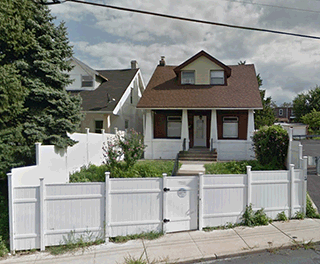
It was in a neighborhood of quite similar bungalows which were as much factory worker tenant houses as small family homes.
Most of this house had been converted in to book rooms. Did he live in this house? I don’t know if I ever knew. He gave us a brief tour and told us each book we picked out would be $1—$5. I can’t recall what his formula was. Likely it was a percentage of his retail price which he had neatly penciled on the upper right-hand corner of every front free endpaper.
“This is legalized rape, you know,” he growled at us.
How do you react to that?
“Why are you selling out?” I asked.
That’s when he told us, “I’m dying by inches. I think this is the best way to liquidate. It hurts to let these go like this. Go ahead start pulling the books you want and stack them on the floor. But just so you know, I’m not happy about it.”
The books were all excellent. He was a very selective buyer. I’d seen his multipage, tiny print, single-spaced line ads in the AB Bookman’s Weekly. The AB. Well, that’s another story—but just about every bookseller in the country would hurry to the mailbox when the postman delivered it on the appointed day.
He would pass through periodically and take the books away to remove them from his inventory. His business was almost exclusively mail order. Most of his clients were colleges, universities and institutions.
Though the circumstances were a bit sad we felt we were helping him in some ways. It was also great fun pulling one great book after another off the shelves.
Then things got a little odd. We’d soon finished going through the bookcases that lined the walls in 6 or 7 rooms in his little house.
Carl told him, ” I think we’re finished.”
He gave us an odd look and then said, “Let me show you my mailing room and file system.”
We followed him to a room we hadn’t seen and along one wall there were rows and of small oak file drawers.
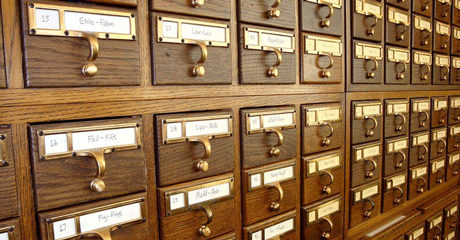
These sat atop a long deep packing table. There were a couple old scales and rolls of brown craft paper. A big spool of jute twine was on a spindle off to the side.
He began to explain his systems.
“These files are customer files. I keep track of who orders what and how often.”
He pulled open a drawer which was packed with hundreds of 3×5 inch file cards.
“This is how I track my customers.”
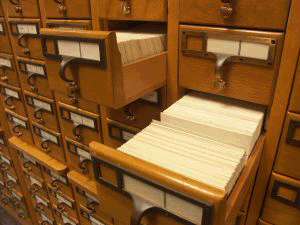
He pulled out a card at random and held it up for us. In bold red ink the top line had “PIA” scrawled over the information on the top line of the card.
“What’s that mean?” I asked
“Pain in the Ass. These are customers who have stiffed me or complained too much or returned books that there was nothing wrong with,” he chuckled. “When it gets to a certain point, I put the PIA on their card to remind myself not to ship them any more books. I have a lot of PIAs. Sometimes I just don’t like their tone or the way they write out their orders.”
He then went to another much larger bank of file drawers. He pulled open a drawer and withdrew a 3×5 index card. On it was written the author and title and publisher, format and condition of a single book. Below that were various letter and number codes.
“What are those for?”
“That’s so I can go find the book when someone orders it. This last number is a shelf number counted up from the bottom shelf. “0” would be the bottom shelf. The next letters tell me which wall the book is on. NEWS—North East South or West. Next is which room the book is in. B is basement, DR is dining room, K—kitchen…”
“I didn’t see any books in your kitchen.”
It had be a tiny thing with a small Formica dinette set for two. Formica and chrome trimmed counter, an old fashioned short (about 5ft tall) refrigerator with rounded lines. A big old chrome toaster, boxes of cereal, saltine crackers and a loaf of bread on the counter…
“The top number is the street address which tells me which house the book is in.”
“House?!”
He gave a gravelly chuckle. “You’re not nearly done. I have 6 more houses like this in the neighborhood. I wasn’t sure I’d want to waste time on you guys if you turned out to be PIAs. You ready for number 2?”
We exited the room that housed his database—his main frame—and went outside. We cut through his backyard and crossed the street to Ken’s next “book house.”
We managed to get through two more little houses in the old blue-collar steel worker neighborhood before we ran out of time, room in the vehicles and energy. These satellite homes of his looked normal from the outside but showed no indication of human habitation inside. There were books in the bathrooms, closets, kitchens…there was just barely enough accommodation should nature call. I say “homes” because they were “book homes”—occupied, inhabited only by books. We stacked the books we picked into his van and drove them the “Mother House.” He brought out an old manual punch button adding machine with a crank and began totaling our books and we packed them.
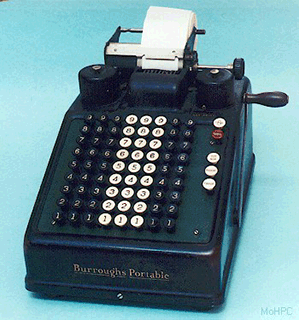
He surveyed the boxes and the paper tape with the total and shook his head and mumbled:
“Pain in the…”
We returned five or six more times. We visited each of his houses. Seven houses devoted to books among dozens of similar houses in his neighborhood. They were not clustered together. Rather, they were random houses he must have bought as he needed space or as they came on the market. Each house exhibited no overt sign that no humans lived there.
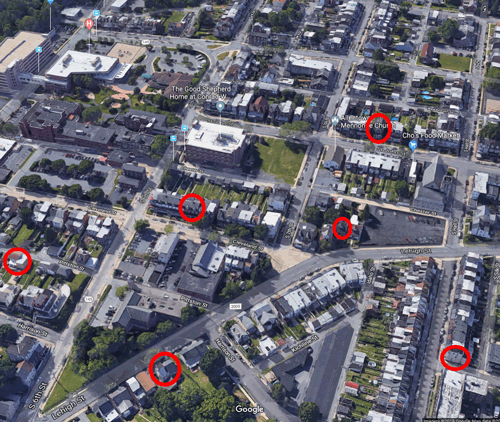
Ken’s houses were populated only by books. Pollsters and Evangelists would get no answer to their knocks. A drug addict breaking in would probably be freaked out. No TV to steal…just NOTHING of any value… There was no furniture, no kitchen table in the kitchens, no beds in the bedrooms only room after room and wall after wall of books.
I guess we ran out energy or interest—or perhaps money—and so we stopped going. Perhaps it was Ken’s idea to disinvite us. We’d done as much as he could take.
What happened? I don’t know. I’ve put out some feelers but so far no one’s told me the end of the story.
Addenda: Some friends have sent some of their own anecdotes about grumpy or odd booksellers. Here they are with their names removed:
One of my first experiences as a young apprentice back in the 1980s was while visiting the California Antiquarian Book Fair. As a young graduate student and aspiring bookseller, I was wandering the stacks near the desk where [XXX] kept piles of material literally bracing each other against the desk. A well-heeled customer had piled up several thousand dollars of books, and was asking to check out and pay for his purchases. Of course, he then made a fatal mistake. He mentioned as [XXX] was totaling up the invoice that if [XXX] alphabetized the material and marked the sections better, he would increase his sales and the shopping experience for the customer. [XXX] immediately stood up, grabbed the man by the collar and physically propelled him to the door, all the time screaming at the top of the his lungs to “Get the F__ out of my store and never return!” The customer was babbling and protesting all the way until [XXX] kicked the front door aside and hurled the man out onto the walkway. Have to say I was pretty impressed, and also admit I never asked where anything was in the store all the succeeding years I experienced the fascinating organization and arrangement of [XXX]’s stock.
Believe I spotted a reference to [XYZ]. You would have had a great time, visiting [XYZ] at home. All of his books were in the basement, racked in metal bookcases so close together that you had to stoop sideways in order to view the lower shelves. No general light source: all “viewing” was done with the use of automotive trouble lights and extension cords. Yet, we went, and we bought. [XYZ]’s books were not priced. Once you made your stacks of books you wanted to buy, he would rank them in the cellar steps, dollar books on the lowest step, two-dollar books on the next, etc., etc. Special volumes might cost you six or seven dollars. Then, you would proceed to his garage, which was designed with a similar space-saving eye. Now, you might begin at 8 a.m. and work five or six hours, but you never went thirsty. [XYZ] was always attentive in replenishing your bottles of Philadelphia beer. Actually, maybe those were the days.
Very much enjoyed the story of “the mail-order book dealer and his seven houses”—it could almost be a fairy tale. It did remind me of an old friend of mine, an usher at my wedding, who got divorced and managed to keep his house. He immediately moved into an apartment and proceeded to fill this suburban residence with books, lots and lots of books. He was, in many ways, more a hoarded than a collector, since he almost never read anything, but he did acquire some fairly high-end titles.

There are no comments to display.